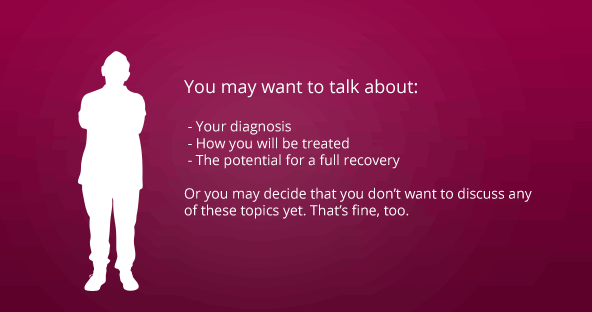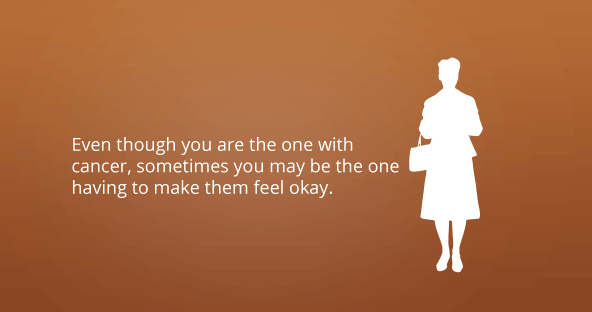From the moment the doctor confirms your diagnosis, you may think of how cancer will affect your work, your physical appearance, and your social life, especially as a young adult under age 40.
You may ask yourself, “Where do I even begin talking to those closest to me about having cancer?
Figuring out how to talk to your friends, family and your partner about your cancer diagnosis can be difficult, but talking about it will help you both feel better.
Deciding What Is Up For Discussion
Before jumping into a conversation with your loved ones, the American Cancer Society suggests setting boundaries.
Decide how much or how little you want to share.

Cancer is a sensitive subject. The word cancer evokes pity and contributes to the idea a patient not being normal.
Respond to sensitive and uncomfortable subjects by tactfully saying something like, “I'm not ready to talk about that yet, and changing the subject.
Discussing Cancer With Friends
Don't be shocked if friends act differently around you. They may steer clear from talking about it because they are simply at a loss for words.
Your friends may be making sure they don't say the wrong thing and trigger a strong emotional response. So, they choose not to say anything at all.
Your diagnosis hits close to home. Friends may not talk because they are simply scared.

According to the American Society of Clinical Oncology, you can put your friends at ease if you first talk about your diagnosis, your treatment and be open to their questions and concerns.
Talking About Support & Independence With Family
Naturally, your family, especially your parents, will want to be your caretakers.
They may share the same anxiety as your friends, but family members will likely desire a more hands-on approach to your care and well-being.
When you're young and have cancer, you may feel guilty and feel like a burden to your parents and other loved ones.
Family may begin taking over chores you normally did like laundry, cleaning and shopping, following chemotherapy and radiation treatment, or following surgical procedures.
Your family may allow you to move back in with them to lessen your financial load. With all the help your family is providing, you may feel like you've lost your independence.
Be honest with your family about your need to do some things on your own. Know that you do have your limitations though, so talk to your family about what tasks you need help with.
If you have a spouse or partner, make sure family members know who's helping with what to avoid potential conflict.
Being Sensitive To Your Partner
A cancer diagnosis may affect the relationship you have with your partner more than other relationships. Being diagnosed with cancer can cause strain in your relationship, but it can certainly bring the two of you together.
Good communication is priority. As always, be both honest about your feelings and respectful of your partner's, and try to talk without distractions, like cell phones and television. Discuss what type of encouragement and support your need from partner.
Try to keep in mind that your diagnosis is hard for him to deal with, too. Be mindful of their feelings of fear, sadness and anxiety. Healthy ways to cope, such as counseling and journaling, can be effective.
It's also important to keep your relationship alive by talking about topics and interests outside of cancer like movies, music and hobbies. When you can, go to dinner or take a walk. Do something that reminds you that you're more than just a cancer patient.
Expressing Your Feelings
Finding the right time and the right way to talk to your family and friends about your diagnosis can be difficult.
When you're ready to talk they may not want to and vice versa.
Seek one-on-one counseling or therapy to facilitate the conversation among you and your loved ones, the National Cancer Institute says.
If family and friends don't want to go to counseling or therapy, you may want to try sharing a journal or starting an email. Writing your feelings maybe be easier than talking them out.
If you have been diagnosed with cancer as a young adult, how'd you talk about your diagnosis with family, friends and your partner? For more information about EIRMC's Cancer Center, or other local services in the Idaho Falls area, please call (208) 227-2700.
$webqFacilityNumber
Need a Physician?